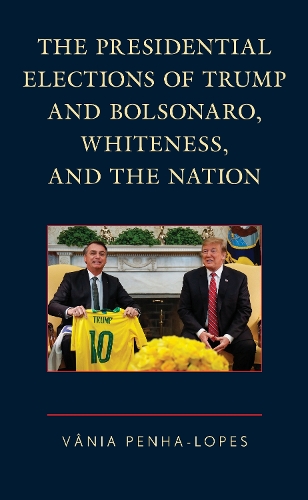
The Presidential Elections of Trump and Bolsonaro, Whiteness, and the Nation
(Hardback)
Publishing Details
The Presidential Elections of Trump and Bolsonaro, Whiteness, and the Nation
By (Author) Vnia Penha-Lopes
Bloomsbury Publishing PLC
Lexington Books
17th November 2021
United States
Classifications
Professional and Scholarly
Non Fiction
Elections and referenda / suffrage
Political campaigning and advertising
324.9730932
Physical Properties
Hardback
252
Width 159mm, Height 228mm, Spine 24mm
644g
Description
The Presidential Elections of Trump and Bolsonaro, Whiteness, and the Nation is a sociological analysis of the similarities between the elections of Donald Trump and Jair Bolsonaro, based on biographies, academic sources, newspaper, television, and internet reports published in the United States and Brazil between 2014 and 2021. The author argues that the success of each candidate reflects the racially hierarchical structure of their societies and the strength of the ideology of White supremacy to maintain that structure despite efforts to dismantle it. Regardless of class and gender, Whites responded to Trump's nativist call to exclude "undesirable" immigrants, especially Mexicans and Muslims, both of whom are racialized as non-White.In Brazil, the country with the largest population of African descent outside of Africa and the largest miscegenation rates in the world, the votes for Bolsonaro pointed to the social wish to achieve Whiteness and thus eliminate (or at least abate) the insecurity that comes from a belief in the racial inferiority of non-Whites. The author suggests that the results of the presidential elections reflect Whites' fear of losing ground after decades of gains by minorities, women, and the poor in both countries.
Reviews
"Vnia Penha-Lopes has performed a service for all of us. Viewed in isolation, Donald Trump and Jair Bolsonaro could appear to be entirely idiosyncratic. Each is a larger-than-life figure with a unique persona, bordering on the cartoonish. Neither is readily intelligible outside his own distinctive context. Yet, as Penha-Lopes shows with nuance and sociological flair, Trump and Bolsonaro are, in fact, representative figures. Beneath the trademarked recklessness of their far-right personas is a long, reptilian history of White supremacism, of which they are the latest incarnations. What does White supremacism look like in extremis, when it has been fiercely challenged Look no farther than Donald Trump and Jair Bolsonaro -- and the parallel constituencies and histories they reflect, which Vnia Penha-Lopes brings to vivid life."
--David N. Smith, University of KansasRace relations in Brazil and the United States have been premised on White supremacy. Yet, Brazil's racial democracy ideology historically helped gloss over this fact given the somewhat more veiled racial discrimination in Brazil compared to the more explicit White supremacism that underpinned legalized segregation in the United States. The elections of Donald Trump and Jair Bolsonaro are game changers in that regard. Trump has brought about a resurgence in White supremacy long thought to have vanished in the US with the formal dismantling of segregation and implementation of civil rights and other initiatives in the latter half of the twentieth century. Jair Bolsonaro has brought White supremacy out in the open and sought a return to the racial democracy ideology in a way not seen in Brazil since the military dictatorship in the 1960s after the subsequent return to democratic rule as well as initiatives to address the very real racial inequality that exist in Brazil. This book provides a masterful comparative analysis of these fateful and not surprisingly intertwined developments, including their implications for race relations and antiracist organizing, by extension, in both countries.
--G. Reginald Daniel, University of California, Santa BarbaraThe United States exports over two trillion dollars' worth of goods and services each year, from food, oil and cars to franchises like Harry Potter, James Bond and Marvel. But we now have an export that reflects a unique moment in American history; Trumpism. This political philosophy is a mixture of White nationalism, jingoism, xenophobia, and a distaste for the rule of law and democratic institutions. The newest importer of this style of Trumpism governance is Brazil's now President Jair Messias Bolsonaro. Positioning himself as an anti-establishment candidate who would "Make Brazil Great Again" (where did you hear that first) Bolsonaro stole Trump's play book and road on to become president of Brazil. Professor Penha-Lopes The Presidential Elections of Trump and Bolsonaro, Whiteness, and the Nation is a perfectly timed, smart and accessible treatise on the social and economic conditions on how these autocrats came to power, the role of White nationalism in both campaigns, the damage they have inflicted each countries' democratic institutions and their collective failure to manage the COVID pandemic. This book should be required reading for anyone who is interested in politics, race relations, the rise of White nationalism and the ways that autocrats can rise to power by fashioning themselves as populist outsiders.
--Charles A. Gallagher, La Salle UniversityUsing extensive media and online accounts as well as secondary academic sources, Penha-Lopes fortifies the frequent media observations of similarities between former US President Donald Trump and Brazilian President Jair Bolsonaro, nicknamed "Trump of the tropics," with sound analytic and empirical grounding.... With its highly readable description of two traumatic presidential elections won by outlandish and disruptive leaders, this comparison serves well as an informative, thought-provoking entre into the contemporary challenge of rising authoritarianism.Recommended. General readers through faculty.
-- "Choice Reviews"Author Bio
Vnia Penha-Lopes is professor of sociology at Bloomfield College and co-chair of the Brazil Seminar at Columbia University.
